Mary has requested that the daily message be given each day to the world. It is
read nightly at the prayer service from her Image Building in Clearwater, Florida, U.S.A.
This is according to her request. All attempts will be made to publish this daily message
to the world at 11 p.m. Eastern time, U.S.A.
We acknowledge that the final authority regarding these messages
rests with the Holy See of Rome.
|
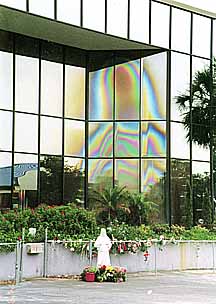 |
October 31, 2001
November 1st Holy
Spirit Novena
Scripture selection is Day 9 Period 1. |
The Novena Rosary Mystery
for November 1st is Glorious. |
The Nursing
Home #3 video is now on the internet.
It is so beautiful and the
sound is excellent!
There
will be a rosary in Clearwater, Florida
on November 5, 2001 at 6:20pm
These rosaries will be broadcast to
different locations,
call for details. Great grace can be released
when we pray as a body.
Messenger: Tomorrow
is All Saints Day—
a holy day of obligation
Friday - First Friday is all souls
day.
We can go to Mass and really
pray for the poor souls.
Think of what it would be like
to be confused and pressed
on and then receive a light from
God
and be able to see things so
clearly.
God can outpour His grace so we
can see so clearly.
Today's first reading was so wonderful.
Romans 8: 26-30
And as well as this, the Spirit too comes to help
us in our weakness, for, when we do not know how to pray properly, then the
Spirit personally makes our petitions for us in groans that cannot be put into
words; and he who can see into all hearts knows what the Spirit means
because the prayers that the Spirit makes for God’s holy people are always in
accordance with the mind of God.
God has called us to share his glory
We are well aware that God works
with those who love him, those who have been called in accordance with his
purpose, and turns everything to their good. He decided beforehand
who were the ones destined to be moulded to the pattern of his Son, so that he
should be the eldest of many brothers; it was those so destined that
he called; those that he called, he justified, and those that he has justified
he has brought into glory.
October 31, 2001
After reception of the Eucharist
Talking to Jesus:
My heart is quieted more than a baby
at the breast of their mother when
I come to You in the Eucharist.
The Eucharist is everything to me,
for I long for Thee my precious
God.
Messenger: I
want to be filled with His life.
His life is abundantly poured out
to me in the Eucharist.
We must pray as Jesus has
directed for our precious
priests.
Can you imagine if the Eucharist
was not so readily available.
Can't you see what a gift this is?
Can't you see how we must
pray for our priest offering
our lives as a sacrifice for
our beloved priests, the Church and the world.
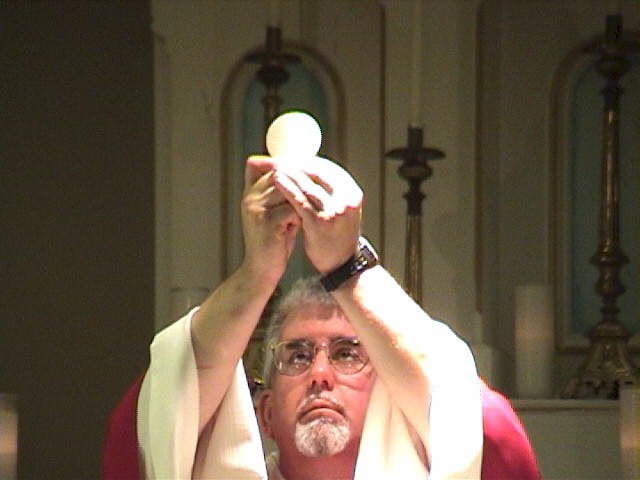
October 31, 2001 message continues
Messenger: We
have this Newsletter 2000 #2 on
tape.
Father Carter is very dramatic and heartfelt,
but there is a sound of tiredness
in his voice.
This was when he was sick but
we didn't know he had
cancer.
The tape is so good, so beautiful.
I remember that constant cough
Father Carter had. It came the end
of May or beginning of June.
The tape is so wonderful.
I know Father Carter was identifying
with Jesus in his suffering.
This is from Newsletter 2000 #2.
The tape can be ordered from us
with Fr. Carter on it, it is
so beautiful.
He taped the last Newsletters before
the tabernacle in China,
our Eucharistic center.

picture on the way to China
October 31, 2001 message continues
Messenger: He would sit there and it was
as though the world was far
away and he was one
with Jesus.
Jesus told us to tape the Newsletter
before the tabernacle in
China, Indiana.

picture on the way to China
October 31, 2001 message continues
Messenger: Please read this excerpt carefully.
Excerpt from the Priestly Newsletter 2000 - Issue 2
Chief Shepherd of the Flock
Suffering:
A Source of Life
- I am the good shepherd:
the good shepherd lays down his life for his sheep. The hired man, since
he is not the shepherd and the sheep do not belong to him, abandons the
sheep as soon as he sees a wolf coming, and runs away, and then the wolf
attacks and scatters the sheep; he runs away because he is only a hired
man and has no concern for the sheep. I am the good shepherd; I know my
own and my own know me, just as the Father knows me and I know the Father;
and I lay down my life for my sheep. (Jn 10:11-15)1
Yet ours were
the sufferings he was bearing, ours the sorrows he was carrying, while we
thought of him as someone being punished and struck with affliction by God;
whereas he was being wounded for our rebellions, crushed because of our guilt;
the punishment reconciling us fell on him, and we have been healed by his
bruises. We had all gone astray like sheep, each taking his own way, and
Yahweh brought the acts of rebellion of all of us to bear on him. Ill-treated
and afflicted, he never opened his mouth, like a lamb led to the
slaughter-house, like a sheep dumb before its shearers he never opened his
mouth. (Is 53:4-7)
-
He hung upon a cross on a hill called
Calvary. Death was near. How much Jesus had already suffered! He had been
derisively crowned with thorns. In a terribly weakened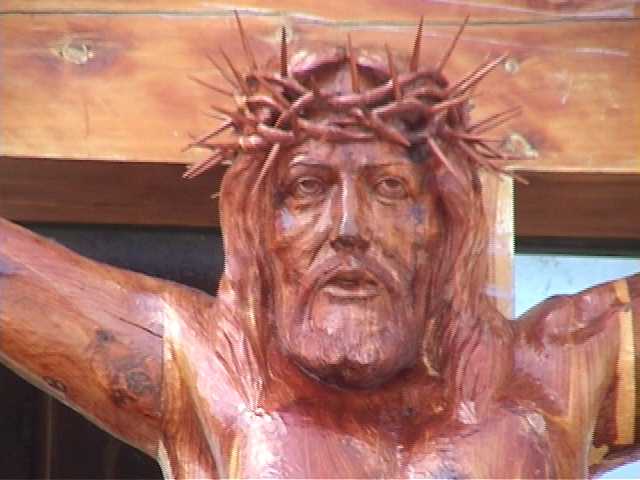 condition, He carried the heavy cross to the hill of Golgotha. There He
was stripped of His garments and mercilessly nailed to the cross. After
all this brutal and agonizing suffering, Jesus finally died.
condition, He carried the heavy cross to the hill of Golgotha. There He
was stripped of His garments and mercilessly nailed to the cross. After
all this brutal and agonizing suffering, Jesus finally died.
Truly the Good Shepherd
had laid down His life for His sheep. That magnificent Heart, overflowing
with love for His Father and all of us, had beat its last.
On the third day, Jesus
rose: ‘Destroy this Temple, and in three days I will raise it up.’
The Jews replied, ‘It has taken forty-six years to build this Temple: are
you going to raise it up again in three days?’ But he was speaking of the
Temple that was his body, and when Jesus rose from the dead, his disciples
remembered that he had said this, and they believed the scripture and what
he had said. (Jn 2:19-22)
Yes, the Good Shepherd
died and rose for our salvation. Behold, the paschal mystery of Jesus!
When we are baptized we
are incorporated into Christ's paschal mystery of death and resurrection.
St. Paul speaks of this marvelous union with Jesus: You cannot have
forgotten that all of us, when we were baptised into Christ Jesus, were
baptised into his death. So by our baptism into his death we were buried
with him, so that as Christ was raised from the dead by the Father’s
glorious power, we too should begin living a new life. (Rm 6:3-4)
Christ has structured
the Christian life by the way He lived, died, and rose from the dead. It is
obvious, then, as Paul tells us above that the pattern of death-resurrection
must be at the heart of the Church’s life. Individually and collectively,
we continually die in Christ so that we may continually rise in Him. Thus we
pass over in a process of ongoing religious transition to a greater
participation in Christ’s resurrection. It is true that our participation
in Christ’s resurrection will reach its completion only in eternal life.
Nevertheless, we begin the life of resurrection here upon earth, in the here
and now of human life, in the midst of joy and pain, in the experience of
success and failure, in the sweat of our brow, in the enjoyment of God’s
gifts. As Christians, we should have a sense of dynamic growth concerning
our here and now life of resurrection.
We cannot maintain the
life of resurrection or grow in it without a willingness to suffer. This
does not mean that we need to feel overwhelmed and heavily burdened in our
lives. The greater portion of suffering for most Christians seems to be an
accumulation of ordinary hardships, difficulties, and pains. At times,
however, deep suffering, even suffering of agonizing proportions can enter
into one’s life. Whether the sufferings one encounters are of the more
ordinary variety or of the more rare and extreme type, Christians must
convince themselves that to relate properly to the cross is to grow in
resurrection, and growth in resurrection means we will also have an
increased capacity to help give resurrection to others.
-
Pope John Paul II speaks of the role
suffering plays in the Christian life: "Every man has his own share
in the redemption. Each one is also called to share in that suffering
through which the redemption was accomplished. He is called to share in
that suffering through which all human suffering has also been redeemed.
In bringing about the redemption through suffering, Christ has also raised
human suffering to the level of the redemption. Thus each man in his
suffering can also become a sharer in the redemptive suffering of
Christ…
"Those who share
in Christ’s sufferings have before their eyes the paschal mystery of the
cross and resurrection, in which Christ descends, in a first phace, to the
ultimate limits of human weakness and impotence: Indeed, he dies nailed to
the cross. But if at the same time in this weakness there is accomplished
his lifting up, confirmed by the power of the resurrection, then this means
that the weaknesses of all human sufferings are capable of being infused
with the same power of God manifested in Christ’s cross. In such a
concept, to suffer means to become particularly susceptible, particularly
open, to the working of the salvific powers of God offered to humanity in
Christ. In him God has confirmed his desire to act especially through
suffering, which is man’s weakness and emptiness of self." 2
-
Dom Hubert Van Zeller observes:
"Men and women who might be turning their afflictions over to God,
who have only to unite themselves in spirit with Christ’s passion, are
found so often to stop short, and even to make of their trial further
matter for selfishness. Even if we do not rebel positively against God’s
providential will, we can become so preoccupied with our troubles as to
leave God out of account.
"Instead of making
us compassionate for others we can squander compassion on ourselves.
Suffering is meant to enlarge our hearts, not shrink them. With suffering
goes the grace of patience, peace, fortitude, penitence and love. All this
can be missed if we make the mistake of turning in upon ourselves as the
result of our trials.
"To the Jews the
cross was a stumbling block, and to the gentiles foolishness. What is it to
us? Often it can be an emblem merely, the significance of the symbol
forgotten. The cross is something in which we are, by reason of our
Christian inheritance, inextricably involved. Do we yield to it or harden
ourselves against it? The cross is not just two planks fitted together on a
certain day in the history of the world, and of all the relics which we
venerate the most sacred, but a fact of our human experience which may or
may not be sacred according to what we do about it." 3
-
Contrary to what many think, Fr. Edward
Leen reminds us that suffering is compatible with happiness: "If men
are prone to err in conceiving the nature of happiness, they will
necessarily err in judging of its opposite. They commonly think that a man
cannot possibly be happy if he is a prey to constant sickness; if he is
condemned to experience habitual poverty and to be buried in obscurity; if
he fails to take an important part on the world stage; if he is
unsuccessful in his enterprises; if he is deprived of the opportunities of
intellectual or aesthetic development; and finally, if he fails to gain
the applause and the esteem of his fellows. Now though all these things
mean grievous sufferings for men, neither singly nor in combination have
they the power to rob him of essential happiness.
"Apart from the
consideration of the life of the Redeemer, certain undeniable facts of
history justify this contention. The saints, in all ages, have been persons
whose lot it was, generally speaking, to undergo greater trials and
sufferings than others are called upon to endure. Yet they were habitually
happy, buoyant and joyous human beings…
"The saints were
not violently wresting words from their literal meaning when they proclaimed
themselves happy. For the happiness they enjoyed was that which is proper
to, and satisfying for man…
"God planned an
unbroken life of happiness for man. The Fall modified, but did not prevent
the realization of this plan. Suffering, but not unhappiness, becomes the
condition of the earthly portion of men’s existence. God does not make
unhappiness here to be the price to pay for happiness hereafter. To be
happy, in the minds of all men, is to fare well, that is, to live
excellently... The Saviour Himself suffered intensely, but He lived the
highest life possible for men. He was, therefore, happy. He assured men that
He could share His own blissful experience with them. It may appear
paradoxical to associate happiness with the mental image of One Who is
called the Man of Sorrows. But an analysis of the nature of happiness will
show that it was fully realized in the earthly life of the Saviour…" 4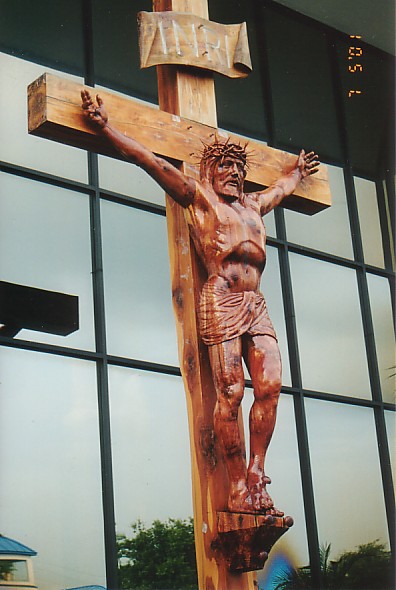
"He comes to it
gladly! This is a strange thing, for the cross is a symbol of shame, and it
is to be His deathbed. Already He sees the very shape of His death in the
wide-spread arms. From this moment He will be inseparable from it, until He
dies on it. He will labour and struggle under the weight of it… Yet Christ
welcomes the cross. He embraces it. He takes it into His arms. He lays His
beautiful hands on it tenderly, those strong hands of a carpenter that are
so familiar with the touch of wood." 5
-
Henri Nouwen tells this story: "I
would like to tell you the story of a middle-aged man whose career was
suddenly interrupted by the discovery of leukemia, a fatal blood cancer.
All his life plans crumbled and all his ways had to change. But slowly he
was able to ask himself no longer: ‘Why did this happen to me?’ but
instead: ‘What is the promise hidden in this event?’ When his
rebellion became a new quest, he felt that he could give strength and hope
to other cancer patients and, that by facing his condition directly, he
could make his pain a source of healing for others. To this day, this man
not only does more for patients than many ministers are able to, but he
also refound his life on a level that he had never known before." 6
- St. Paul tells us: But we hold this treasure in pots
of earthenware, so that the immensity of the power is God’s and not our
own. We are subjected to every kind of hardship, but never distressed; we
see no way out but we never despair; we are pursued but never cut off;
knocked down, but still have some life in us; always we carry with us in
our body the death of Jesus so that the life of Jesus, too, may be visible
in our body. Indeed, while we are still alive, we are continually being
handed over to death, for the sake of Jesus, so that the life of Jesus,
too, may be visible in our mortal flesh. (2 Co 4:7-11)
NOTES:
1. Scripture quotations are taken from The New Jerusalem
Bible, Doubleday.
2. Pope John Paul II, On The Christian Meaning of Human Suffering,
United States Catholic Conference, Nos. 19 and 23.
3. Dom Hubert Van Zeller, More Ideas for Prayer, Templegate, p. 112.
4. Edward Leen, C. S. Sp., Why the Cross?, Sheed & Ward, pp.
246-247, 255, 285.
5. Caryll Houselander, The Way of the Cross, Sheed & Ward, p. 21.
6. Henri Nouwen, Out of Solitude, Ave Maria Press, p. 57.
end of excerpt from Newsletter 2000 - Issue 2
October 31, 2001 message continues
Messenger: Many
times we blame others when we don't
feel good inside.
We have to look inside ourselves.
Going to the Eucharist and praying
before the tabernacle helps us to
be pure. So much grace is given
there.
We must pray for our holy priests.
Please pray for an urgent intention.
Please pray for a donation so we can
send the Priestly Newsletter II
Book to the priests by Christmas.
This year we could only get out
2 Newsletters so far (but they
were 20 pages.
Messenger: We
cannot expect others to make us
feel happy.
We become happy from inside.
We are happy God dwells in us in a
special way when we are in the
state of grace.
Because of someone else's bad mood
that shouldn't change our moods.
Otherwise we determine how we will be
by how others are or are not treating us.
We must be in control of our emotions.
Some people are tired or lonely and they
look outside themselves for
some things to make them happy.
Sometimes when they feel bad they
blame how they feel on others.
Jesus wants us to read the entry in this
message from Father Carter's Newsletter
over and over again.
Fr. Carter gave a talk about living in
the moment.
From a Lenten Homily, March 24, 2000
Live in the Moment
Today’s Gospel in its story certainly
points ahead to Jesus in His Passion and death. And as we read passages such
as this during the Lenten season, we are reminded once again that the Church
in her Liturgy of the Word gives us an opportunity to undergo a purification,
an ever deepening cleansing of ourselves so that we may be a more fit
instrument for receiving the great graces which are to be given to us at the
time of the Resurrection memorial on Easter. And so all in all, Lent is a time
of purification to prepare us for ever-greater gifts of the Lord. It’s a
time of self-discipline, a time to renew our efforts to be self-disciplined in
the service of the Lord. Self-discipline is an aspect of purification. And I
suggest that one of the most difficult acts of self-discipline in the
spiritual journey is to concentrate on the present moment. We have a very
strong tendency to disregard the importance of the present moment by focusing
in a wrong way on the past or in a wrong way on the future. There are proper
occasions for thinking of the past and the future. For example, we have to
learn from the past and we have to prepare for the future, but our great
emphasis has to be upon the present. There is a Latin axiom which says, age
quod agis, age quod agis, which means: do what you are doing, concentrate
on the present. And of course we are familiar with that term in the history of
spirituality: the sacrament of the present moment. And so the discipline of
Lent certainly encourages us to include in a deeper self-discipline a greater
determination to get as much as we can out of the present moment. People with
a terminal illness have an opportunity as they prepare for death for increased
prayer, contrition, love of God. However, some are taken very, very quickly.
But for those who have the opportunity of knowing with some certainty the time
of their death, I’m sure as they look back on their lives, they are saddened
by the many times they did not use time and opportunities for the service of
the Lord properly, and are overjoyed at those times in which they did use the
present opportunity properly. A great means we have of living in the present
properly is a greater focus upon our Lord. For if I have that awareness of the
fact I am united with Jesus here and now, why should I be concerned so much
about the future or the past? Yes, a great help in living in the present and
deriving all the good we can from it for ourselves and others is an ever
greater focus upon Jesus, because the more I focus upon Jesus and the more I
live with Him in the present moment, the more I am satisfied with the present
moment. And so let us in our Lenten activity resolve to grow in that
self-discipline - which is very difficult at times - to really live in the
presence with the fullness of our being as much as is possible, with the help
of God’s grace. Now is the day of salvation. Now is the day of salvation.
end of Father Carter's homily
October 31, 2001 message continues
Messenger: We
are living every moment to please the
Father, to help in the work of redemption.
Jesus wants us to read the entry on Suffering
from today's Newsletter, over and over again.
Matthew 5: 43-48
‘You have heard how it was said, You will love
your neighbour and hate your enemy. But I say this to you, love your
enemies and pray for those who persecute you; so that you may be
children of your Father in heaven, for he causes his sun to rise on the bad as
well as the good, and sends down rain to fall on the upright and the wicked
alike. For if you love those who love you, what reward will you
get? Do not even the tax collectors do as much? And if you save
your greetings for your brothers, are you doing anything exceptional? Do
not even the gentiles do as much? You must therefore be perfect, just as your
heavenly Father is perfect.’
Matthew 7: 1-5
‘Do not judge, and you will not be judged; because the
judgements you give are the judgements you will get, and the standard you use
will be the standard used for you. Why do you observe the splinter in your
brother’s eye and never notice the great log in your own? And how dare you
say to your brother, "Let me take that splinter out of your eye,"
when, look, there is a great log in your own? Hypocrite! Take the log out of
your own eye first, and then you will see clearly enough to take the splinter
out of your brother’s eye.
Matthew 8: 16-17
A number of cures
That evening they brought him many who were possessed by
devils. He drove out the spirits with a command and cured all who were sick.
This was to fulfil what was spoken by the prophet Isaiah:
He himself bore our
sicknesses away
and carried our diseases.
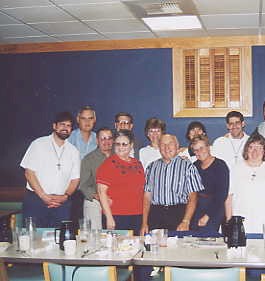
A few members from Jasper
from the rosary October 23, 2001


Autumn leaves from Jasper
It cannot be altered in any way.
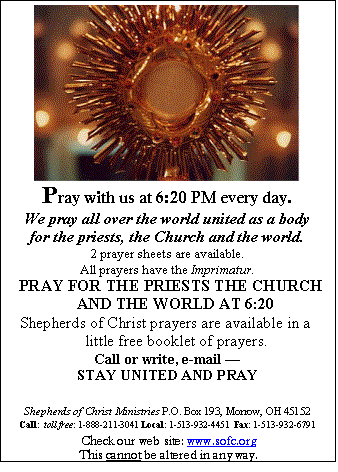
Download
the free  software
to view and print the PDF files of the advertisements
software
to view and print the PDF files of the advertisements
 PDF file of Advertisement
PDF file of Advertisement
Please
allow a couple of minutes to download, thank you.
This cannot be altered in anyway.

 PDF file of Advertisement #1
PDF file of Advertisement #1
Please allow a couple of
minutes to download, thank you.
Messenger: A shorter ad may be as follows.
This cannot be altered in anyway.

 PDF file of Advertisement #2
PDF file of Advertisement #2
This cannot be altered in anyway.

 PDF file of Advertisement #3
PDF file of Advertisement #3
Table of
Contents
Previous Daily Message
Main Shepherds of Christ Page
 Copyright
© 2001 Shepherds of Christ.
Copyright
© 2001 Shepherds of Christ.
Rights for non-commercial reproduction granted:
May be copied in its entirety, but neither re-typed nor edited.
Translations are welcome but they must be reviewed for moral and
theological accuracy by a source approved by Shepherds of Christ Ministries
before any distribution takes place. Please contact us for more information.
All scripture quotes are from the New Jerusalem Bible, July 1990, published by Doubleday.
Revised:
October 31, 2001
URL: http://www.SofC.org
Contact Information for Shepherds of Christ
Email: info@SofC.org
Shepherds of Christ Ministries
PO Box 193
Morrow, Ohio 45152-0193
Telephone: (toll free) 1-888-211-3041 or (513) 932-4451
FAX: (513) 932-6791




 condition, He carried the heavy cross to the hill of Golgotha. There He
was stripped of His garments and mercilessly nailed to the cross. After
all this brutal and agonizing suffering, Jesus finally died.
condition, He carried the heavy cross to the hill of Golgotha. There He
was stripped of His garments and mercilessly nailed to the cross. After
all this brutal and agonizing suffering, Jesus finally died.






